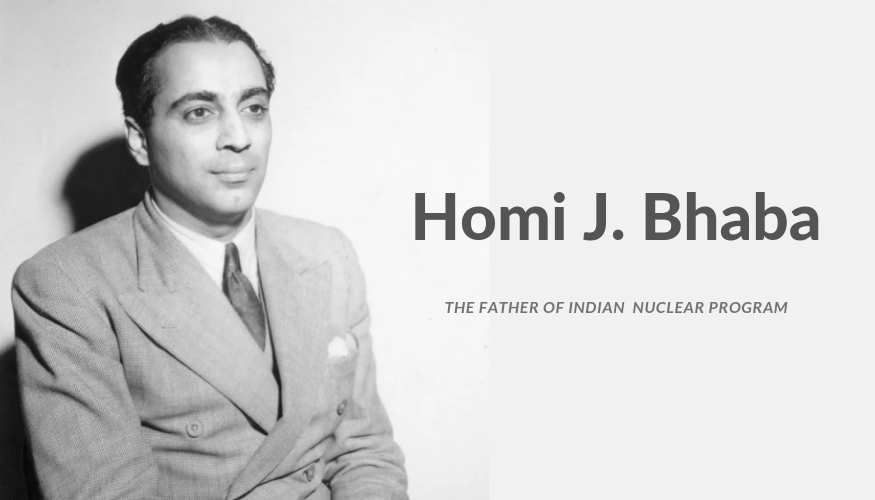Homi J. Bhabha
Born: 30 October 1909
Bombay, Bombay Presidency, British India
Father: Jehangir Hormusji Bhabha
Mother: Meheren
Education :
He
received his early studies at Bombay's Cathedral and John Connon
School and entered Elphinstone College at
age 15 after passing his Senior Cambridge Examination with Honours. He then
attended the Royal Institute of Science in
1927 before joining Caius College of Cambridge University. This
was due to the insistence of his father and his uncle Dorabji, who planned for
Bhabha to obtain a degree in mechanical engineering from
Cambridge and then return to India, where he would join the Tata Steel or Tata Steel Mills in Jamshedpur as a metallurgist.
Bhabha's father understood his son's predicament, and he along with his
wife agreed to finance his studies in mathematics provided that he obtain first
class on his Mechanical Sciences Tripos exam. Bhabha sat the Tripos exam in
June 1930 and passed with first class honours. Meanwhile, he worked at the Cavendish
Laboratory while working towards his PhD degree in
theoretical physics.
Career:
Starting
his nuclear physics career
in Britain, Bhabha had
returned to India for his annual vacation before the start of World War II in September 1939. War prompted him to
remain in India and he accepted a post of reader in physics at the Indian Institute of Science in Bengaluru, headed by Nobel laureate C.V. Raman. During this time, Bhabha played a key role in
convincing the Congress Party's
senior leaders, most notably Jawaharlal Nehru who later served as India's first Prime
Minister, to start the ambitious nuclear programme. As part of this vision,
Bhabha established the Cosmic Ray Research Unit at the Institute, began to work
on the theory of point particles movement,
while independently conducting research on nuclear weapons in 1944. In
1945, he established the Tata Institute
of Fundamental Research in Bombay, and the Atomic Energy Commission in
1948, serving as its first chairman. In 1948, Nehru led the appointment of
Bhabha as the director of the nuclear program and tasked Bhabha to develop the
nuclear weapons soon after. In the 1950s, Bhabha represented India in IAEA conferences,
and served as President of the United Nations Conference on the Peaceful Uses of Atomic
Energy in Geneva, Switzerland in
1955. During this time, he intensified his lobbying for the development of
nuclear weapons. Soon after the Sino-Indo war, Bhabha aggressively and publicly began to call
for the nuclear weapons.
Bhabha gained international prominence after deriving a
correct expression for the probability of scattering positrons by electrons, a
process now known as Bhabha scattering. His major contribution included his work
on Compton scattering, R-process, and furthermore the advancement of nuclear physics.
He was awarded Padma Bhushan by Government of India
in 1954. He later served as the member of the Indian Cabinet's
Scientific Advisory Committee and provided the pivotal role to Vikram Sarabhai to set up the Indian National
Committee for Space Research.
Atomic Research:
Homi Jehangir Bhabha was working at the Indian
Institute of Science, there was no institute in India which had the necessary
facilities for original work in nuclear physics, cosmic rays, high energy
physics, and other frontiers of knowledge in physics. This prompted him to send
a proposal in March 1944 to the Sir
Dorabji Tata Trust for establishing 'a vigorous school of
research in fundamental physics'.
The trustees of Sir Dorabji Jamsetji, Tata
Trust, decided to accept Bhabha's proposal and financial responsibility for
starting the Institute in April 1944. Bombay was chosen as the location as the Government of
Bombay showed interest in becoming a joint founder of the proposed institute.
The institute, named Tata Institute
of Fundamental Research, was inaugurated in 1945 in 540 square
meters of hired space in an existing building. In 1948 the Institute was moved
into the old buildings of the Royal Yacht club.
When Bhabha realized that technology development for the
atomic energy programme could no longer be carried out within TIFR he proposed
to the government to build a new laboratory entirely devoted to this purpose.
For this purpose, 1200 acres of land was acquired at Trombay from the
Bombay Government. Thus the Atomic Energy Establishment Trombay (AEET) started
functioning in 1954. The same year the Department of Atomic Energy (DAE) was
also established. He represented India in International Atomic Energy
Forums, and as President of the United nations Conference on the Peaceful Uses of Atomic
Energy, in Geneva, Switzerland in 1955. He was elected a Foreign Honorary
Member of the American Academy
of Arts and Sciences in 1958.
Nuclear Power Programme:
Bhabha is generally acknowledged as the father of
Indian nuclear power. Moreover, he is credited with formulating a strategy of focusing on extracting power from the country's vast thorium reserves rather than its meagre uranium
reserves. This thorium focused strategy was in
marked contrast to all other countries in the world. The approach proposed by
Bhabha to achieve this strategic objective became India's
three stage nuclear power programme.
Awards: Padma Bhushan (1954)
Padma
Bhushan (1954)
Fellow
of the Royal Society
Fields: Nuclear Physics
Institutions: Atomic Energy Commission of India
Tata Institute of Fundamental
Research
Cavendish Laboratory
Indian Institute of Science
Trombay Atomic Energy Establishment
Death:

Comments
Post a Comment